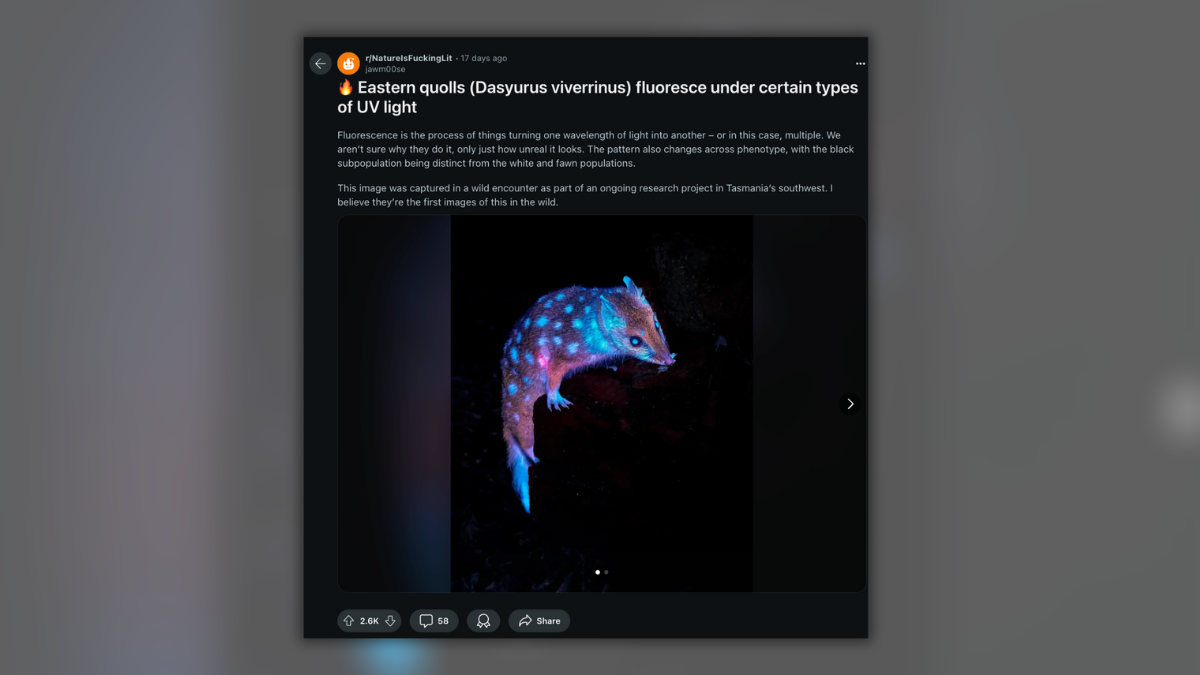A post shared to Reddit on Sept. 17, 2024, claimed to show a marsupial known as an eastern quoll as it
The photograph above was posted to Reddit by Benjamin Alldridge, whose website identifies him as an "occasional Pulitzer winner" and "award-winning space and nature photographer." Alldridge was also the 2024 Australian Geographic Nature Photographer of the Year.
It's possible that the photo was edited to emphasize the animal's fluorescent qualities, but it is otherwise authentic, and in general, it is true that quolls — and many other mammals — have been shown to fluoresce under light.
Paul Revie, a projects officer at the Wildlife Preservation Society of Queensland, told Snopes that research shows many animals, those from Australia included, have "fluorescing pellage patterns."
Revie referred Snopes to a 2023 study published in the Proceedings of the Royal Society of Queensland, which showed that northern quolls (scientific name Dasyurus hallucatus) and several smaller dasyurids display a mixture of fluorescing colors under ultraviolet (UV) light.
Based on the study, Revie says it's "likely that the other three Australian quolls also demonstrate fluorescence."
The study examined 148 wild mammals (mostly roadkill) for the presence of fluorescence in their fur. When a flashlight was shown on their fur, 95% of the mammal species examined from the Australian Wet Tropics had at least a low level of fluorescence, one of which was the quoll.
Briefly defined, fluorescence is the visible light and radiation emitted back after an object, such as fur, has absorbed certain wavelengths that give off an appearance of glowing.
According to the 2023 study, all marsupials displayed some level of fluorescence in their fur when exposed to UV or other wavelengths. Quolls and bandicoots displayed "stunningly bright pink fur."
"Nearly half of the quoll specimens, both male and female, displayed intense, strong, dark pink fluorescence throughout their fur, both in the brown flanks and through the white spots," wrote study author Linda Reinhold, a researcher at Australia's James Cook University who has tested other "glow in the dark" species.
"Some of the male quolls also had a yellowish green fluorescence on the sides of their necks/shoulders. The chest patch fluoresced bright lemon yellow, particularly in the fresh roadkill."
The characteristics in the quolls described above also match the fluorescing characteristics seen in the photograph on Reddit. Snopes contacted Alldridge for more information about how he captured the photograph in question and will update this article if a response is received.
Photoluminescence and fluorescence in fur were described in the 1700s and have been seen in mammals across landscapes in the centuries since. The characteristic is due to certain amino acids found in keratin, a protein found in hair, feathers and fur.
A 2023 study published in the Journal of Mammology also wrote that it's likely all mammal fur has "general low-level photoluminescence" due to the presence of keratin. And if that fur contains tryptophan metabolites or light-absorbing molecules known as porphyrins, fur will glow "luminously under ultraviolet light."
"It seems from the research that a wide range of terrestrial mammals express fluorescence, but as yet the functions and evolutionary purpose is unknown," said Revie.
"It may help individuals find other members of their own species from a distance for mating, or then again it could be an incidental property, with fluorescence being the default for hair unless it is heavily pigmented."
Similarly, researchers in 2020 described in the journal Mammalia fluorescence in platypus specimens that otherwise appear brown under visible light.

(Mammalia)
The Australian Government writes that the eastern quoll is an endangered species found in Tasmania, New South Wales, and Victoria. The medium-sized carnivorous marsupial is largely threatened by disease, fox predation, poisoning and "persecution."
Snopes also verified social media posts that claimed scientists in 2011 genetically modified cats such that they glow green under ultraviolet light.

